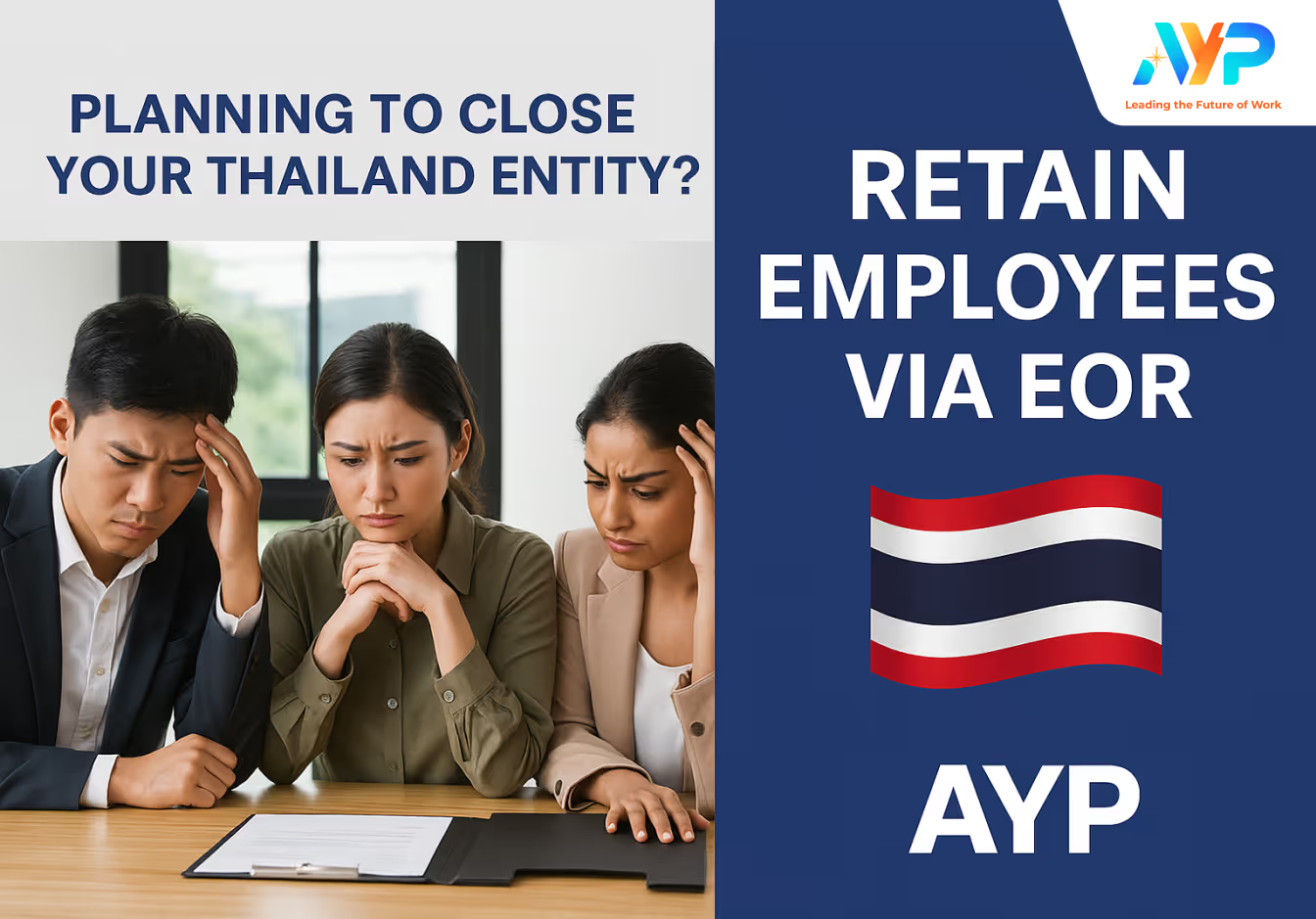BLOG |
Employer of Record & PEO
Published:
September 2, 2025
Last updated:
September 1, 2025


Thailand remains a popular hub for foreign investment, thanks to its strategic location, skilled workforce, and improving infrastructure. But for companies planning to shut down operations—whether as part of a business pivot or an M&A restructuring—it's vital to understand the country's employment regulations.
Under Thailand's Labour Protection Act, employers are legally required to notify employees of termination and follow due process in cases of layoffs or company closure. Failure to comply can lead to fines, lawsuits, or reputational damage.
This guide is tailored for HR leaders and operational heads from Singapore-based firms seeking to close Thai entities while retaining critical talent through professional employment models.
Thailand's employment law is governed primarily by:
These laws apply equally to Thai and foreign companies operating in Thailand. Among the most relevant for closures is the Labour Protection Act (LPA), which outlines rules for employment termination, severance pay, and advance notice requirements.
📚 Reference: Thailand's Labour Protection Act (English Translation) – Ministry of Labour, Thailand
If you're shutting down your Thailand entity, employee termination procedures must be handled correctly and humanely. These are not only legal obligations but also critical to protecting your employer brand and avoiding litigation.
Your core responsibilities include:
Importantly, there is no "at-will" termination in Thailand. All dismissals must be backed by legal cause or follow correct procedural steps.
The standard advance notice for terminating an employee (excluding misconduct cases) is at least 1 full pay cycle (usually 30 days), unless you pay wages in lieu of notice.
📌 Note: If your business is relocating and it affects employee livelihoods, written notice 30 days in advance is mandatory under Section 120 of the LPA.
Thailand mandates severance pay based on tenure, unless the employee is terminated for gross misconduct.
Severance Structure:
Other compensation includes:
📚 Reference: Thailand BOI: Termination & Severance
If your employees include foreign nationals, you must comply with the Alien Working Act B.E. 2551 (2008).
Key requirements:
📚 Reference: Thai Immigration Bureau Guide
Failure to cancel work permits properly can lead to fines of up to THB 100,000.
Employees under probation are still entitled to notice or wages in lieu unless their employment contract specifies otherwise.
An employee can be dismissed without severance pay if they:
However, these must be well-documented and provable in court.
📌 Note: Legal precedent in Thai Labour Courts tends to favour employees, so ensure cause-based terminations are legally sound.
Non-compliance with Thailand labour laws during closure can result in:
Financial Penalties: Fines up to THB 200,000 per violation
Legal Disputes: Wrongful dismissal claims and court proceedings
Regulatory Action: Labour Department investigations and sanctions
Reputational Damage: Negative publicity affecting future operations
These risks can also delay your entity closure timeline and lead to unplanned costs.
If you're closing a Thai entity but want to retain key employees, using professional employment services in Thailand is a strategic move.
Professional employment enables you to:
Retain Critical Talent: Keep your best performers without entity overhead
Maintain Compliance: Expert management of Thai employment obligations
Preserve Relationships: Continue customer and vendor relationships
Stay Market-Ready: Positioned for re-expansion when timing improves
At AYP Group, our Thailand professional employment solution allows you to:
✅ Hire quickly and compliantly post-closure
✅ Retain talent without HR headaches
✅ Meet statutory obligations for terminations
✅ Offload legal risk and maintain goodwill
Learn more: Thailand Professional Employment Services
1. Start Planning Early: Begin compliance preparation 2-3 months before closure
2. Get Legal Advice: Consult Thai employment lawyers for complex cases
3. Document Everything: Maintain detailed records of all termination procedures
4. Communicate Transparently: Keep employees informed throughout the process
5. Consider Alternatives: Explore professional employment for talent retention
Shutting down a Thai entity isn't as simple as issuing pink slips. With strict notification rules, severance pay mandates, and visa obligations, failing to follow due process can expose your company to significant risk.
The good news? With the right strategy—including transparent employee communication and a trusted professional employment partner like AYP Group—you can exit compliantly and retain your best people.
Key takeaways:
Let AYP Group help you transition your workforce seamlessly with compliant professional employment solutions in Thailand and across Asia.
Contact our Thailand specialists to discuss your closure strategy and talent retention options.